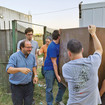

Pope Francis has called Catholics to “go out to the periphery” to do missionary work among the poor and marginalized. A group of priests and seminarians from New York did just that during a recent trip to Buenos Aires appropriately called, “In the Footsteps of Pope Francis.”
Men from the Cathedral Seminary House of Formation in Douglaston, Queens, traveled to the Argentine city Feb. 19 to March 2.
“The hope was that by meeting priests, seeing the pastoral work that is going on, meeting the people and their faith and hearing the stories about Pope Francis, it would help give us insight into who Pope Francis is and the way he is pastorally leading the Catholic Church,” said Father Luke Sweeney, vice rector of the Cathedral Seminary and a priest of the archdiocese, in an interview with CNY after the group’s return.
The New Yorkers visited significant sites in the life of Pope Francis and did missionary work. Traveling with the 12 seminarians and Father Sweeney were Father Ray Roden, a spiritual director at the seminary and organizer of the trip, and Father Luis Saldana, director of spiritual formation, St. Joseph’s Seminary, and a priest of the archdiocese.
“The purpose of the trip was born out of an interest of getting to know who Pope Francis is, and to get to know him through the people who were important to him as a Jesuit and as a bishop in Buenos Aires,” said Ryan Muldoon, a second-year pre-theology student at Cathedral Seminary. As Archbishop of Buenos Aires, then-Jorge Bergolio devoted time to serving people in the slums of Buenos Aires.
“We wanted to see the peripheries that Pope Francis himself had experienced and that encouraged us to go to the peripheries,” said Muldoon, who entered the seminary from St. Aedan’s Parish in Pearl River.
The seminarians helped in the construction of St. Francis Chapel for Immaculate Virgin parish in Barrio Ramon Carillo, Villa Soldati. This slum is built on an old garbage dump. The chapel is being financed and built entirely by the people.
“St. Francis said, ‘Rebuild my church’ and they really are rebuilding a church. It certainly was very moving,” said Muldoon respectfully.
“Working with the local people we were in some way able to meet the pope. He was so commonplace, walking the streets, knocking on doors. They knew him very personally,” said Muldoon. “He felt very strongly about the people in those neighborhoods.”
Steven Gonzalez, a first-year pre-theology student who comes from St. Lucy’s Parish in the Bronx, said, “I think the place where I felt really connected to Pope Francis was when we went to the Villas, where the poorest people of Buenos Aires live.” When the group went to Soldati, he said, “When we were there, I was so moved by all the people’s stories about how the pope had in many ways touched their lives. In many ways, we could, in almost a tangible way, feel the pope’s enormous impact and presence in that neighborhood.”
Buenos Aires priests are following Pope Francis’ example. Muldoon said, “To see the love and devotion of the parish priests and how they live amongst their people and understand the struggles the people are going through, it was a tremendous model of priesthood.”
The group also visited places of importance in the life of Pope Francis, including Mary Help of Christians Church, where he was baptized. A copy of Pope Francis’ baptismal certificate with his sacraments is posted on the baptismal font. Listed are his First Communion, his ordinations to the deaconate, the priesthood, his vows as a Jesuit, among others; and at the bottom, crammed in a tiny space and written in Spanish in ordinary ink. it says, “Elected Bishop of Rome, Successor of Peter.”
“It’s a reminder that Pope Francis, just like all of us, was initiated with the sacraments,” said Muldoon with joy. “He was baptized in an ordinary parish. He had a particularly graced moment, but sacraments are at the heart of the priestly ministry and that is a point on which I can relate with him,” he said.
Reflecting on the trip, Gonzalez said, “I was reminded all throughout the trip of Pope Francis’ call for the church to reach out to those who are most marginalized.”
He added, “It brought to mind the famous quote by Blessed Mother Teresa of Calcutta: ‘We think sometimes that poverty is only being hungry, naked and homeless. The poverty of being unwanted, unloved and uncared for is the greatest poverty. We must start in our own homes to remedy this kind of poverty.’”
He said the trip gave him insight into the mission of a priest, adding, “I would say that we see the poorest of the poor in our culture here in America today, not only in people who are materially poor, but also those who are spiritually deprived of God’s truth. I was reminded by this trip that, if God willing I become a priest, that as a shepherd, I should ‘smell like the sheep’ and reach out to the ‘sheep’ that are in most need of assistance around me.”